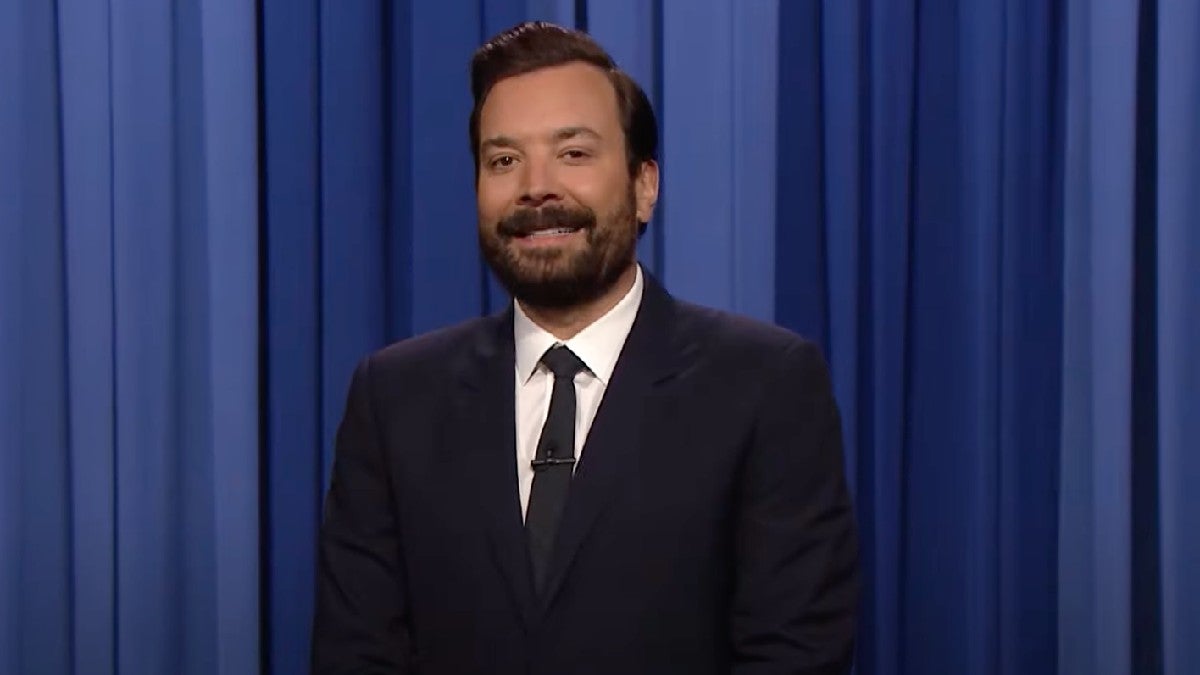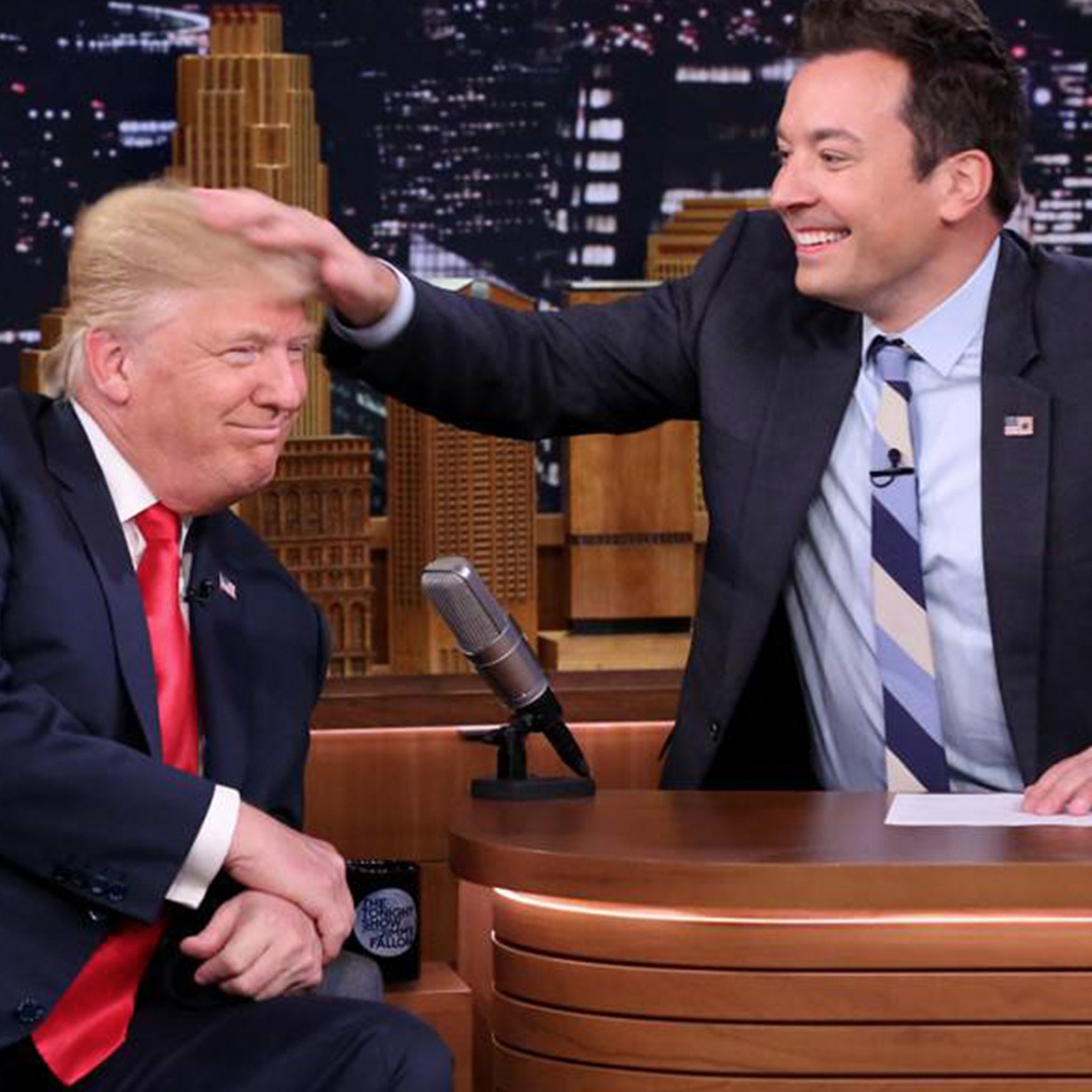Is Jimmy Fallon, the jovial face of "The Tonight Show," truly apolitical, or is his carefully crafted comedic persona masking a deeper allegiance? Fallon's stance on political matters has become a subject of intense speculation, particularly in the wake of his interviews with prominent figures like Donald Trump.
The world of late-night television, particularly the landscape of political satire, has undergone a significant transformation. Shows like "The Tonight Show Starring Jimmy Fallon" have become increasingly important platforms for political discourse, whether intentional or not. The host's approach to political interviews, his jokes, and even his silences can carry significant weight in shaping public perception. Fallon's ability to deftly navigate the often-treacherous waters of political commentary has been the subject of both praise and criticism.
Born James Thomas Fallon on September 19, 1974, in the Bay Ridge neighborhood of Brooklyn, New York, Fallon's career trajectory from stand-up comedian to late-night host is a testament to his charisma and comedic talent. He has built a brand around his infectious enthusiasm, musical parodies, and celebrity impressions. However, his reluctance to engage directly with political topics has sparked debate about his motivations and the potential consequences of his approach. This reluctance, coupled with his on-air interactions with politicians from across the spectrum, has fueled curiosity about his actual political leanings.
| Category | Details |
|---|---|
| Full Name | James Thomas Fallon |
| Date of Birth | September 19, 1974 |
| Birthplace | Bay Ridge, Brooklyn, New York City |
| Education | Saugus High School, The College of Saint Rose |
| Known For | Stand-up comedy, "Saturday Night Live" cast member, Host of "The Tonight Show Starring Jimmy Fallon" |
| Political Affiliation | Ambiguous; Has shown support for Democratic values but avoids direct labeling. |
| Notable Relationships | Married to Nancy Juvonen |
| Children | Frances Cole Fallon, Winnie Rose Fallon |
| Reference Website | NBC - The Tonight Show |
Fallon's early life in Brooklyn, raised in a Catholic household, provided him with a foundation of values that may or may not have influenced his later political views. The specifics of his upbringing, and the evolution of his personal beliefs, offer valuable insights into the man behind the comedy. Even though he was raised in Catholic faith, he stopped going to church due to changes in the church.
His entertainment career began with stand-up comedy, followed by a successful stint on "Saturday Night Live" (SNL). This marked a pivotal point in his career, giving him a broader platform to display his talents, which ultimately paved the way for "The Tonight Show." It was during this period that he began to build his comedic voice, establishing his trademark style of humor. As a cast member of SNL, Fallon honed his skills in impressions, parody, and writing, all of which became hallmarks of his later work. His portrayal of various characters and his ability to impersonate celebrities, was a significant factor in his rise to stardom.
The transition from a cast member of SNL to the host of "The Tonight Show" in 2014 was a natural progression, building on his popularity and experience. He inherited a late-night legacy, but was determined to put his own distinct spin on the format. Fallon's approach to his show is rooted in a blend of humor, music, and interviews. His emphasis on entertainment often comes at the expense of overt political statements. However, the choice of guests, the tone of his interviews, and the type of jokes he makes all carry political overtones.
Fallon has often been praised for his ability to make guests feel comfortable, which has allowed him to create memorable moments. Yet, this perceived "softness" has also drawn criticism. For example, when Donald Trump appeared on the show, some accused Fallon of giving the former president an easy ride. Many critics argue that a late-night host has a responsibility to challenge political figures, not to provide a platform for them without rigorous questioning. The perception of going soft on Trump by not asking the presidential candidate any questions of substance has sparked debate about the show's role in political discourse.
The comedian's jokes and monologues have occasionally touched on political issues, including the presidential debate between Kamala Harris and Donald Trump, which provided the basis for jokes in his September 10 "Tonight Show" monologue. Often, however, his humor steers clear of partisan divisions, prioritizing general observations over pointed critiques. Fallon described the Republican victory as a huge historic comeback for someone who literally never went away.
Fallon's political views are not always easy to define. He has, at times, offered subtle nods to democratic values, showing support for President Obama, for example. On the other hand, his comedy, though often devoid of overt political alignment, has occasionally poked fun at Republicans as well. He has consistently avoided directly identifying himself as a Democrat or Republican, further complicating the question of his affiliation.
His handling of Trump's recent appearance on the program, has been viewed by some as a missed opportunity to hold the former president accountable. Liberals have accused Fallon of not pressing the presidential candidate on important issues, suggesting that he prioritized entertainment over substantive questioning. This controversy underscores the delicate balance a late-night host must strike between attracting viewers and engaging in meaningful political discourse.
In the context of celebrity influence on public opinion, Fallon's position is particularly relevant. He has the ability to influence millions of people through his show, and his choices about how to address or avoid political topics have ripple effects. The rise of social media and the increasing importance of online engagement have magnified the impact of his actions. The buzz around the "Jimmy Fallon political party 2024" highlights the extent to which public interest has shifted to the celebrity and their political affiliations.
The entertainment industry is increasingly entangled with politics. Celebrities are frequently asked to share their opinions, endorse candidates, or get involved in campaigns. While some embrace the role of political commentator, others, like Fallon, prefer to maintain a distance. This makes understanding Fallon's motivations even more important.
The question of what Jimmy Fallon's political silence is costing is multifaceted. The show has been under scrutiny because of perceived political neutrality or avoidance of controversy. The silence may have consequences when he refrains from engaging in political issues. On the other hand, it could be argued that Fallon's focus on entertainment gives his audience a much-needed break from the constant churn of political news and debate. And, for the show itself, his approach may allow him to attract a wider audience, rather than alienating viewers with partisan messaging.
The ambiguity surrounding Fallon's political leanings has created space for ongoing speculation. Fallons comedic work often mocks both sides of the political spectrum. According to Lichter, Fallon told three times fewer political jokes than Leno in the same time period. He hit democrats in 59 percent of his political jokes versus 41 percent for republicans. This approach is in keeping with his desire to appeal to a wide demographic and avoid alienating any segment of his audience. Despite the lack of overtly partisan humor, however, his commentary, and his choices of guests, still influence the publics perception of political issues.
The future of Fallon's political engagement is difficult to predict. Will he become more vocal about his views? Will he continue to maintain a safe distance from the most divisive issues? Whatever path he chooses, it is likely to be influenced by the evolving political landscape and the changing expectations of his audience. The evolution of his approach to politics and the impact it has on his career and legacy, will be fascinating to observe in the coming years.


